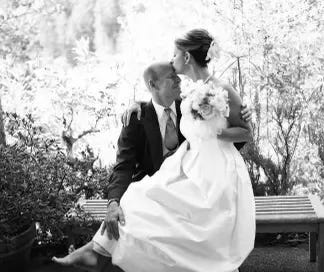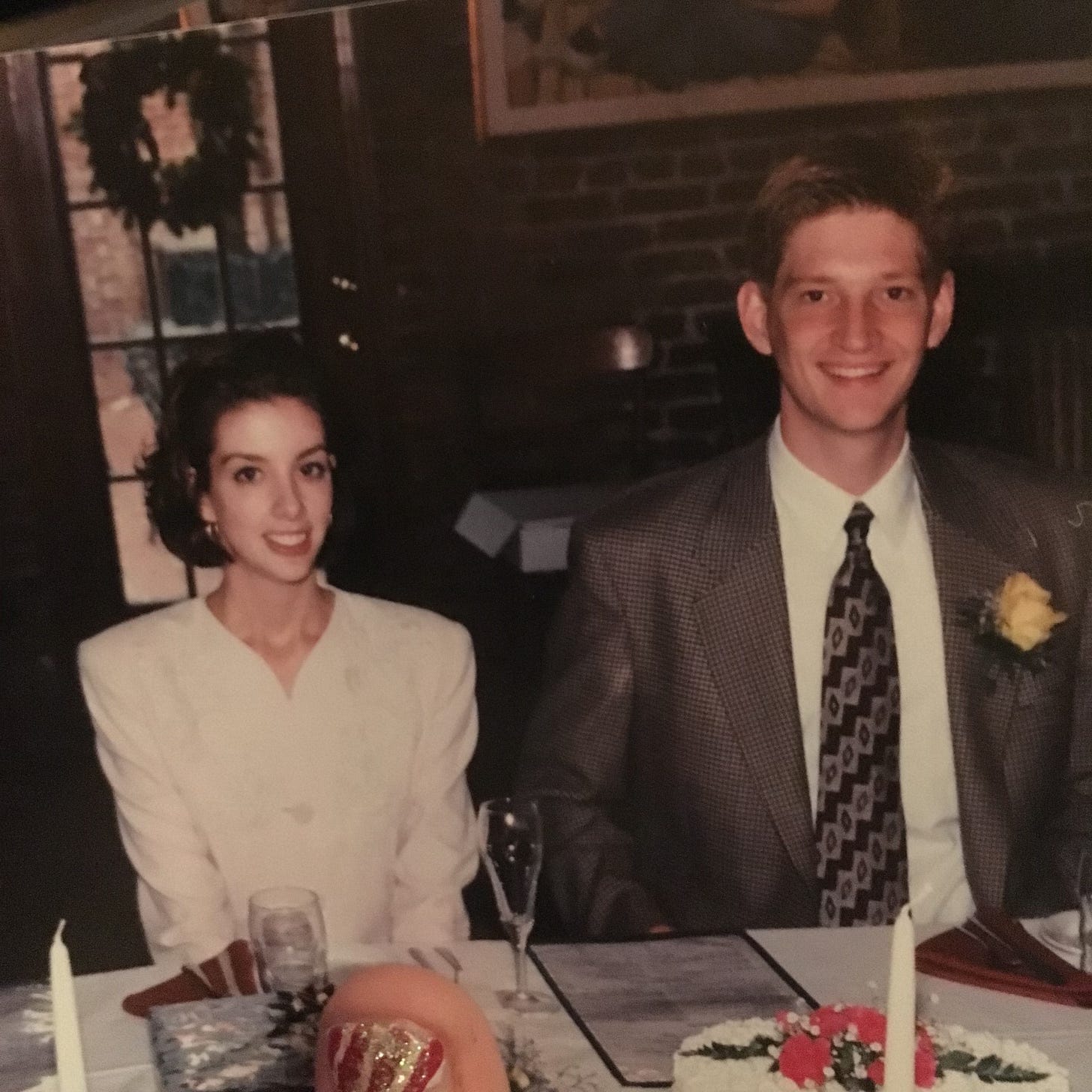“To be fully seen by somebody, then, and be loved anyhow — this is a human offering that can border on miraculous.”
Elizabeth Gilbert
I’ve been thinking about marriage lately and the ways it can break us or shape us, depending on the partner we choose. How long-term partnerships can trigger and deepen our wounds or allow us to examine our pasts and heal ourselves. How they can encourage us to double down on the most negative parts of our personalities or allow us to trust enough to become our best selves. How we can be undone by romantic love or be reparented by it.
The first time I married I was just 23-years-old. My college boyfriend and I eloped the same year we graduated from the University of Missouri, exchanging vows over wedding rings we bought at a JC Penney. Even by 1994 standards, when the average age to marry in America was 25, we were young to be making a lifetime commitment.
In hindsight, our decision to marry was probably a codependent strategy to avoid being launched alone into the world as adults after graduating. Speaking for myself, I was definitely seeking some kind of familial structure and support. At the time, my parents, who had been married for 26 years, were engaged in a brutal divorce. My mom had fallen in love with a family friend, and soon after, my dad began dating his secretary.
As an only child, I knew intuitively that the end of their marriage was the beginning of the end of our family. My parents’ parenting style could at best be described as benign neglect, which was not all that uncommon among white, middle class families in the 1970s. As a result, we weren’t particularly close knit, and it felt inevitable that the new crack in our family’s façade would lead to a catastrophic fissure.
In her memoir Crying in H Mart, Michelle Zauner, also an only child, wrote about a similar experience when her mother died: “There was a dangerous and unspoken prospect looming, that without my mother to bond us, my father and I would drift apart … I could see that in the aftermath, there would be a struggle to coexist. That there was a good chance we could become unmoored, that our family would dissolve entirely.”
If my family was going to fall apart (and it did), I would create a new one. Three months after I married, I got pregnant. Three months after that baby was born, I got pregnant again. And by the time I was 30, I had three beloved babies.
Needless to say, the chaos that ensued was not a recipe for marital bliss. For those who marry between the ages of 20 and 25, there is already a 44 percent to 60 percent chance of divorcing. Add to our immaturity two fulltime careers, financial stressors and extended family drama, and you actually have a recipe for irreparable resentments.
We divorced after 13 years: a painful but inevitable uncoupling of two people who were never going to be able to grow a healthy marriage. Thankfully, I learned what not to do during my parents’ divorce, and we managed to coparent for over a decade with very little drama (for a more honest analysis, please consult our three amazing adult children).
When I was 38, I married again — this time to a man 12 years older than me. We fell madly in love and got engaged after a whirlwind courtship. Unlike me, John came to our relationship almost fully formed. He’d been married before, as well, but he was mature and wise and had been raised by loving, attentive parents in a functional family.
One of the first commitments John and I made after getting married was to go to therapy together … forever. And at least once a month. We didn’t want to make the same mistakes we’d made in prior relationships and figured the best way to protect our new marriage was to consider counseling a prophylactic against marital decay.
Now, nearly 15 years later, we’ve had a lot of therapy (together and alone), give or take some time off due to travel and COVID restrictions. Over the years, we’ve shown up at our appointments in the middle of heated arguments and had to hash out solutions. We’ve shown up thinking we had nothing to talk about and then uncovered a simmering or serious issue. And we’ve shown up just to sit on our therapist’s couch and hold hands and talk about how much we love each other.
“There are a hundred paths through the world that are easier than loving. But who wants easier?”
Mary Oliver
I don’t pretend to know the secret to a happy marriage or partnership for everyone, but these are some of the most life-changing lessons I’ve learned in therapy and in real life over the years:
Be each other’s biggest fans: First and foremost, we are teammates. We root one another on and we console each other when we’re down. John is at times my coach and at other times my cheerleader. Our respect and admiration for one another is the foundation we build everything else on top of. Don’t let a day go by without complimenting your partner or showing appreciation in some way. Sometimes when we get in bed I’ll go through a gratitude list: “Thank you for bringing me coffee this morning. Thank you for handling the dogs while I was on a call. Thank you for making dinner…” It ends the day on a positive note.
Be communicative: If something is worrying or bothering you, say it (diplomatically). Constantly check in on your relationship. John and I often say to one another: “Is there anything I could be doing to be a better partner to you?” Nothing is off limits, including tough topics like addiction, sex, money, etc. Candid conversations help keep your connection alive and prevent issues from being swept under the rug.
Be curious: When your partner is upset or hurt, be curious instead of defensive. This is really hard for me. I’m pretty pugnacious, so when someone wants to fight, I’m ready to answer that bell. So listening, breathing, and asking questions like, “Why do you think that?” or “How can I do that better next time?” takes me out of fighting mode and puts me in a place where I can feel empathy for my partner.
Be optimistic: John is the most positive person I’ve ever met. I, on the other hand, tend to focus on the negative and assume the worst. True to our birthplaces, he’s all Los Angeles sunshine and I’m Rochester rain. But because of our marriage, I’m more like John now, and I’ve experienced firsthand how assuming the best – in each other, in other people, in the world – makes a positive outcome more likely. And it’s just a better way to live.
No name calling or low blows or threatening to leave – ever. No notes.
Connect physically: Whether it’s a hug when your partner comes in the door or cuddling on the couch while watching television or carving out time for sex when it’s been too long since your last rendezvous, figure out how to demonstrate and deepen your attraction and connection to each other.
Connect mentally: Keep trying new things together. Take a class, read the same book, listen to new music, take a trip. This is an important way to grow together instead of apart. If you’re not growing, you’re likely to get bored.
Have your own life, too: A relationship is a container – it should be big enough to hold the two of you and then other things you want to do on your own, including hobbies, work and friendships. We’re a couple, but we’re also two independent humans with unique interests. I look at it like this: If I die before John, I want him to have the strongest safety net possible, including a robust social life. And he wants that for me, too.
It’s ok to go to bed mad: Some of the biggest arguments John and I have had are right before we go to sleep. There’s something about being mad in bed with the lights off and not seeing each other’s faces that makes it too easy to stay angry. After a lifetime of being told “Never go to bed mad,” our therapist gave us permission to sleep on it. So instead of arguing for hours with no resolution and no sleep, we found that if we agree to disagree until the morning, everything seems lighter when we wake up.
Rupture and repair: I grew up being taught how to hold a grudge. When my parents were upset, they refused to speak to each other and to me. Undoing that lesson has required A LOT of work. Forgiving quickly and moving on is a discipline that I will have to practice forever. Holding onto grudges or resentment only harms you and, ultimately, your marriage. Staying angry feels isolating; fighting and making up can bring you closer together.
Thanks to our commitment to try to follow these guidelines (we don’t always succeed) our marriage has continued to get stronger and more fulfilling year after year. The odds were stacked against us. According to data, over 60 percent of second marriages end in divorce. Yet here we are, nearly 15 years later — still married, still in love and still keeping our commitment to show up every week in our therapist’s office.
“Won't you come unbury me
Could you light me up like a lemon grove
I'll save you from this dreamy life
To the hardest love you could ever know”
Pernice Brothers, The Weakest Shade of Blue







What an absolutely beautiful and honest post. Few people share the reality of the work involved in a healthy marriage. Grateful for this.
Given how she conducts her public life, I am not at all surprised to learn that in her private life Shannon is thoughtful, self-aware, and open to change and growth. Personally, I never thought I’d get married. In the nuclear family from which I hail, we are 0/4 in marriages with my parents and three much-older siblings all divorcing after marriages ranging from merely ill-advised to just plain awful. My long-term partner’s parents’ marriage did not end in divorce but was a disaster that arguably might have yielded a better outcome if it had. The night we met 19 years ago (on the wildly successful Kerry/Edwards Campaign… not 🤦🏻♀️), we talked for hours about everything, including marriage, and he stated, “It’s not marriage I’m avoiding, it’s divorce,” echoing sentiments I’d been voicing for years by then. Our partnership has had ups and downs over the years, but it was after therapy, coming out of the pandemic feeling even more solid than we went in, and doing our wills together that we knew we were in it for the long haul. So, on the 20th anniversary of the day we met we’re making it legal next year. My only regret is not doing therapy sooner - I come from a family whose approach to mental health is ‘Snap out of it!’ so I had to personally de-stigmatize therapy to be able to participate. Cultivating a happy and fulfilling life partnership is a life skill and like most skills, can benefit from coaching.